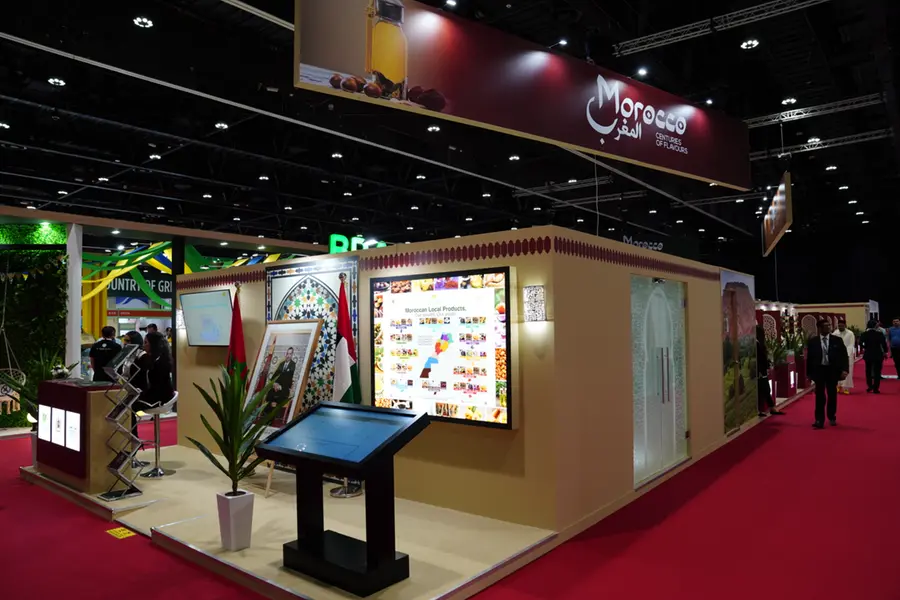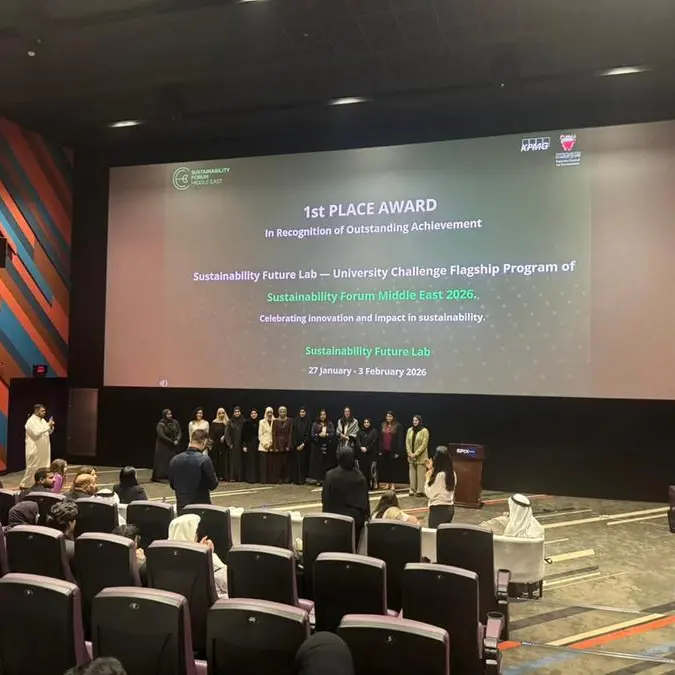PHOTO
Abu Dhabi: The Agency for Agricultural Development (ADA) organizes the Moroccan participation in the first edition of the Abu Dhabi International Food Fair (ADIFE) held in Abu Dhabi from 06th to 08th December 2022. Capitalizing on the achievements of the past twelve years, the ADA aims through this participation to further strengthen its support to local product producers, in the wake of the strategy «Green Generation 2020-2030».
This major meeting of professionals in the agri-food sector, knows the participation of 25 exhibitors of local Moroccan products who are from all regions of the Kingdom and represent 36 agricultural cooperatives grouping more than 910 small farmers, including 316 women (35%). A great opportunity to highlight all the novelties, but also the diversity, quality and richness of the Moroccan offer, especially since 17,000 professionals of all nationalities will walk through the maze of the show, looking for business opportunities.
ADIFE 2022 is a valuable springboard for professionals from around the world to learn about the latest market developments and trends and consumption habits in the Middle East region in general and the United Arab Emirates in particular. This exhibition also represents a great opportunity to boost Moroccan exports and diversify outlets to support local Moroccan products which are a strategic sector of the national economy.
In this context, the Moroccan exhibitors have benefited, upstream of this major event, a marketing and technical-commercial supervision provided by the ADA. Thus, no less than 250 appointments B to B have been scheduled by the ADA for the benefit of Moroccan participants and on the sidelines of the show, to enable them to establish business relationships with major customers. The objective is also to introduce and further strengthen the presence of local products on the Middle East market, especially in central purchasing, mass distribution and delicatessens.
Designed and arranged to reflect the uniqueness and richness of moroccan culture and the national soil, the moroccan pavilion offers visitors the opportunity to enjoy unique experiences through which they can taste the national flavors and colors and discover the moroccan hospitality. The program also includes a series of culinary and cultural activities. These animations give a very faithful overview of the assets, but also of the gustatory and qualitative richness of the moroccan gastronomy and the cultural heritage of the Kingdom.
It should also be noted that this resumption of international events, which comes after a long pause following the pandemic of COVID-19, will further strengthen the activities implemented by the ADA to remedy the marketing problems encountered by producers of local products and open new business opportunities.
An exemplary Participation in 2019
According to many visitors and professionals, Morocco was well-noticed at the SIAL Middle East 2019 trade show. In total, the pavilion hosted several hundred prospects from various Middle East countries, several contracts have been signed due to all the B2B meetings organized by the Agency for Agricultural Development for local product producers. Moroccan hospitality was also present, through a warm pavilion evoking openness and authenticity, culinary shows provided by Moroccan chefs have sublimated visitors who were able to discover for the first time the quality and richness of Moroccan cuisine. This participation was also an opportunity to present morocco’s agricultural and agribusiness offer in the field of traditional products as well as the opportunities offered by the Kingdom in agriculture for strengthening trade with the United Arab Emirates.
Local products: A key sector and a dedicated strategy
Considered a strategic priority for Moroccan agriculture by the Green Morocco Plan, the local products are a real opportunity for the establishment of sustainable local development, particularly in rural geographically and economically isolated areas. The development strategy for local products introduced by the Green Morocco Plan aims to promote the mutation of a local production to a more organized formal sector, offering quality product lines with high added value with a sustainable access to national and international markets. To this end, the Agency for Agricultural Development (ADA) in charge of the implementation of the Green Morocco Plan, introduced in 2011, the Traditional Products Development Department with the primary and exclusive mission to develop the marketing of these products.
Axes of the Local products marketing development strategy :
The local products development strategy is based on five priority intervention levers at different levels of the value chain:
- Upstream development and equitable aggregation partnerships ;
- Creation of regional logistical and commercial platforms nearby producers ;
- Improved market access to modern distribution channels nationally and internationally;
- Support the efforts of traditional product labeling ;
- Realization of institutional communication campaigns to establish the reputation of local products with the general public.
Product labeling Essential prerequisite for any strategy for labeling and protection of locam products, the introduction of the system for distinctive signs of origin and quality of these products has started since 2008 by the Ministry of Agriculture and Maritime Fisheries. Promulgated on May 23, 2008, the law No. 25-06, on Distinctive Signs of Origin and Quality (SDOQ) of agricultural and fisheries products, created the necessary legal framework for the recognition and protection of Moroccan local products. Three Distinctive signs were selected: The Geographical Indication (GI), the Appellation of Origin (AO) and Agricultural Label (AL).
Since the entry into force of Law No. 25-06, the Moroccan labeling system allowed the recognition of 75 Distinctive Signs of Origin and Quality (SDOQ) after study and review of specifications relating thereto, by the National Commission SDOQ. Indeed, 75 products have been certified, these include the Protected Geographical Indication (PGI) «Argane”, the PGI «Clémentine de Berkane» the Protected Designation of Origin (PDO) «Safran de Taliouine « the PGI «Dattes Majhool de Tafilalet» the PGI «Amande de Tafraout» the PGI ‘Keskes Khoumassi» the PGI «Figue de Bararie d’Ait Baamrane» the PGI «Dattes Boufeggous» the PGI «Câpres de Safi»
Exhibitors list ADIFE 2022
| PRODUITS | EXPOSANTS |
| Spices | El Hajja Fatiha Cooperative |
| Almonds and Walnuts | Taytmatine Agricultural Cooperative |
| Couscous | Albadil Tabiai Cooperative |
| Couscous | Women’s Cooperative for Couscous Production |
| Aromatic and medicinal Plants | Rouh Nabta Cooperative |
| Dates | Tamezmoute N’Tinzouline EIG |
| Almonds and Henna | Nkob Agricultural Cooperative |
| Aromatic and medicinal Plants | ALOABIBEN Cooperative |
| Honey | MAHI Cooperative |
| Olive Oil | Sefrou Olive Oil EIG |
| Argane Oil | Tafyoucht Cooperative |
| Couscous | Al Mabroum Cooperative |
| Argane Oil | Marjana Cooperative |
| Olive Oil | Tyout Cooperative |
| Jam | Nour Agricultural Cooperative |
| Honey | Manahil Bni Znassen Cooperative |
| Vegetable Oils | Yahya Bio Oil Cooperative |
| Honey | El Majd Cooperative |
| Honey | Douahej Cooperative |
| Saffron | Ounzine Cooperative |
| Argane Oil | Argana Noumsekroud Cooperative |
| Argane Oil | Attadamoun Cooperative |
| Saffron | Fougoug Cooperative |
| Honey | Al Hikma Cooperative |
| Aromatic and medicinal Plants | Aghssane Tetouan Cooperative |
-Ends-
About the Agency for Agricultural Development
The Agency for Agricultural Development (ADA) is a public institution with legal and financial independence, under the tutelage of the Ministry of Agriculture, Fisheries, Rural Development, Water and Forests.
Since its inception in 2009, the Agricultural Development Agency (ADA) has made a fundamental contribution to implementing the agricultural strategy of the Kingdom of Morocco.
The Agency for Agricultural Development (ADA) also works to improve the business climate and encourage agricultural investment, by mobilizing and valuing agricultural lands within the framework of partnership between the state and the private sector.
ADA establishes agricultural aggregation projects of the new generation, supports young entrepreneurs, as well as develops solidarity agriculture, by encouraging and implementing sustainable projects with the aim of improving farmers’ income, creating job opportunities for youth and empowering rural women.
As part of the implementation of the strategy for development of the marketing of the moroccan local products, ADA organizes continuous programs for the rehabilitation of groups producing local products, as well as accompanying them in order to access regular markets at the national and international levels.
In addition, as an agency accredited by the Climate Adaptation Fund and the Green Climate Fund, the Agency for Agricultural Development has direct access to the financial resources of these funds in order to finance programs related to climate change in the agricultural sector and other vital sectors in Morocco.




















